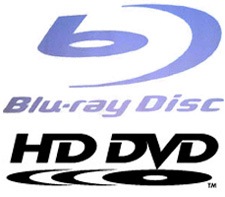HD DVD vs. Blu-ray: In the End the Consumer Wins, But That Victory May Be Further Off Than We Imagine
01/25/2007 14:58 Filed in: Technology

With the gift card I received recently (see previous post), I bought an HD DVD drive that plugs into my Xbox 360. The drive is not for games, but simply for watching HD DVD movies. I didn’t buy it because I thought that HD DVD was better than Blu-ray; I bought it simply because as a $200 add-on, it is the cheapest way to watch high-definition movies today.
But my apathy toward which format is best surely puts me in the minority among high-def movie aficionados. If you ask people who care about this, they usually have taken a side and have a very strong opinion. This is on the level of Mac vs. Windows, Chevy vs. Ford, Democrat vs. Republican or Sunni vs. Shi'a.
According to who you ask either format has the superior picture and either format is outselling the other. Truthfully, it’s a great picture either way, and I don’t know if the human eye can tell a difference. One thing that Blu-ray discs have going for them is that they hold more data (50 gb) than the HD DVD discs (30 gb). But the truth is that no movie really needs the amount of space that either holds, even in high-def. At best, the promise of these new technologies means that we shouldn’t see as many multiple disc sets as we used to. A whole television series ought to fit on one or two discs for instance. But if anyone thinks bigger is better, Toshiba announced at CES a few weeks ago that they had developed a triple-layer HD DVD disc capable of holding more than the Blu-ray. Of course whether or not this triple-layer disc can be read on current HD DVD players is anyone’s guess because Toshiba didn’t say.
As I said, in the end the consumer will win because the picture quality really is significantly better than standard DVD drives. To compare, I played the HD DVD version of King Kong that came with my HD DVD drive. Then, I placed the regular DVD version Superman Returns in the player. I've always been pleased with the qualities of regular DVD's. But now I had seen "the look and sound of perfect" (the HD DVD slogan). I immediately put my copy of Superman Returns on eBay since there is a high-def version of it. The difference is that dramatic.
Often HD DVD vs. Blu-ray is compared to the VHS vs. Betamax format war of the late seventies/early eighties. I've always heard that Betamax was better, but I have no way of testing this assertion myself, so I'll just take everyone's word on it. In the end, even if VHS wasn't as good as Betamax, the consumer still won because we were now no longer tied to the airtime schedule of programs we wanted to watch. The consumer will win again this time because our entertainment experience will be increased; but contrary to what you might hear, it's not going to happen over night. If you've been putting off buying a player because you want to see which format will come out on top, you might just want to flip a coin and get one now.
Here's what I've noticed in my short-lived experience (less than a week) as an HD DVD owner: it's hard to find the HD DVD discs (and Blu-ray, too). The largest selection I've seen so far is at Best Buy, but you pay full price. At discount stores, they're few and far between. Wal-Mart doesn't carry them yet--at least not locally. Target has a small selection of a minimally equal amount of HD DVD and Blu-ray discs. Clubs like Columbia House don't carry either format yet. And you can't seem to rent them either. I went by both Hollywood Video and Blockbuster and neither one of them carried high-def discs. The guy at Blockbuster said that the chain was waiting to see which format came out on top. I told him it may be a long wait.
I've read a number of reports that say the format war will be over by the end of 2007. I have my doubts--let me explain why. What we're talking about here is the adoption of not just a new technology, but a replacement technology for video entertainment. In the VHS vs. Betamax war, I suppose a lot of it had to do with supply, price and marketing. But either technology worked with the televisions everyone had at the time. If I remember correctly off the top of my head, the DVD player was introduced around 1997, but because of its expense, folks didn't start buying them until around 2000 when they rushed to buy DVD copies of The Matrix on the sets that had come down in price.

But it's more complicated than price alone, and I don't see too many folks talking about this. When someone bought a VHS (or Betamax) player or a DVD player, it worked on their existing television. But high-def players require high-def televisions. Owners of high-def TV's are still clearly in the minority. The only way for sales of HD DVD and Blu-ray discs to increase is for more people to buy high-def televisions. But for that to happen, the prices must come down--significantly down.
Therefore the success of the new high-def formats are dependent on more than quality alone. They are dependent upon the adoption of high-def televisions. This isn't going to be solved anytime soon. It make take years.
This is why I've said that if you're undecided, flip a coin and pick a format. Many are touting LG's new combo HD DVD/Blu-ray hybrid player (BH100) as the answer to the problem. Actually it doesn't solve the format wars at all. Further, I'm not impressed with the machine. Besides its ridiculously high price (around $1200), recent word is that it cannot display the HD DVD logo because it is not fully compatible. Evidently, although it plays HD DVD video, it cannot access any of the interactive content on the discs.
Am I worried that the HD DVD format will lose and my investment in discs will be lost? No, not really. I would expect that I'm fine for at least five years or more, especially since Bladerunner, The Lord of the Rings Trilogy and the Matrix Trilogy (some of my favorite movies) are all slated for release on HD DVD. With that in mind, I'm good. And considering that it's still possible to buy old technology such as VHS players and even LP turntables, I'm not worried that I'll get stuck with a technology.
However, I'm very glad that I never got into Laserdiscs...









